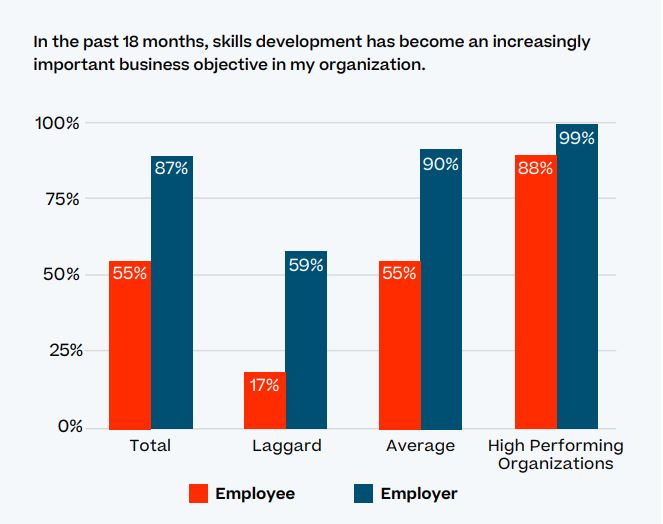Research shows a huge skilling perception gap: Employers vs employees in Cornerstone research

86% of employers are confident that they can develop their employees' skills.
Only 55% of employees share that confidence.
The upskilling perception gap is increasingly emerging as a problem in the post-pandemic workplace, with prior research by various organisations all pointing to employers thinking they are going over and above to upskill the workforce, but employees feeling they are still getting the short end of the stick.
In a newly released global study by Cornerstone OnDemand, the gap is further quantified: since 2020, employers have gotten more confident in their ability to meet employees' skilling needs, but employees have gotten less confident.
The CSOD research, collated in the "Thriving in the Global Skills Shortage: Your Path Through the Wilderness" report, also found that an organisation's performance is closely correlated with the size of this gap. High performing organisations - rated as such by employees - have a confidence gap of just 11%, indicating that employees are experiencing positive results from management's efforts. But average performing organisations have a confidence gap of 35%. And low performing organisations have a gap of 42%. On top of this, the employees of low performing organisations have extremely low confidence in the management's attitude towards skills development in general.
 Image: Cornerstone People Research Lab
Image: Cornerstone People Research Lab
One possible reason for the gap may simply be that many organisations are planning to upskill their employees, but haven't actually started doing so yet. The research found that only 26% of employers have already begun investing in skills development as a major priority. The rest say they plan to do so in the future - either within the next year or the next three years, with 12% actually putting their plans five years down the road.
Given that skills today can be said to have an expiry date, becoming less relevant over time, and that people are spending less and less time in a given job, it's not surprising that employees who look at this long time horizon do not feel confident about getting the training they need.
That said, the higher performing an organisation is, the shorter its time horizon for investing in upskilling tends to be. And the CSOD research surfaced a few ways in which organisations can perform better, at least on the upskilling front. These include:
- Investing in additional skills development content and the technology to deliver it
- Providing more coaching and mentoring opportunities, including career shadowing opportunities
- Providing more tailored and comprehensive career guidance
- Ensuring that employees get on-the-job skills training
















